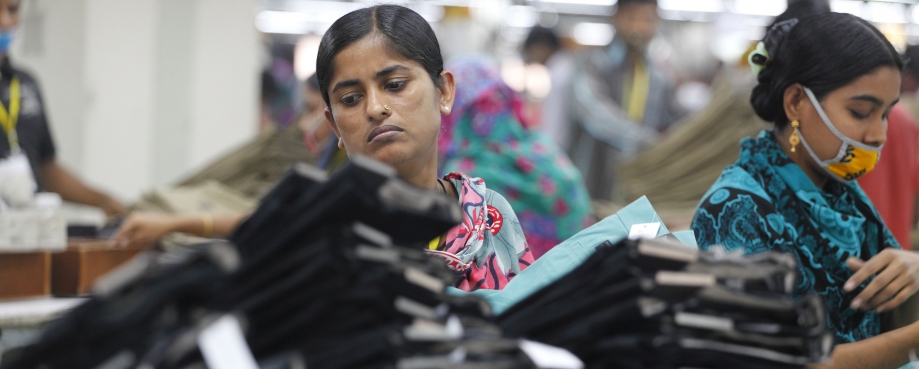
Following the storming of a café in Dhaka’s diplomatic quarter by extremist gunmen, fears have been aired in the media – and still continue to be raised – that the attack may force international retailers to rethink their sourcing policies and the government to rein back on workers’ rights. Peter McAllister argues that neither should happen.
It will take time for Bangladesh to fully come to terms with the appalling attack on a local Dhaka restaurant by Islamic extremists that resulted in 20 deaths over the 1st and 2nd July.
Our sympathies are with those who have suffered and lost loved ones.
But it does the country no favours to encourage the notion that major international clothing retailers may rethink their sourcing policies as a result. Nor that the attack may frustrate attempts to improve working conditions in the garment trade.
Yet, at ETI, we’ve seen acres of print attempting to make these exact points. And that action to improve labour rights “may be stalled as the government has other priorities”.
That’s why it’s been encouraging to see both the Bangladesh Accord and Alliance, alongside the ETI and others, refuting such claims.
Retailers may think twice about flying in staff for non-crucial meetings
Large retailers may think twice about flying in international staff for non-crucial meetings in the short term.
But this does not equate to jeopardising entire trading relationships. Nor to putting on hold planned improvements in working conditions.
For example, threats of industrial flight were not raised following the terrible attack in Nice a fortnight ago. Neither was it on the table after the coordinated attacks in France and Brussels in November 2015 when 120 people died.
While France and Brussels may present very different economic and political circumstances, it just hasn’t been an issue.
It shouldn’t be an issue in Bangladesh either.
The importance of the Bangladesh garment sector
Bangladesh’s garment sector is important. Not only for the country’s export earnings, but for the millions of mainly women workers who depend on the sector for their wages. And also for international buyers.
A quick recap of statistics outlines the situation clearly:
- The Bangladesh economy is growing by six per cent a year.
- Apparels and textiles accounts for almost 12 per cent of the country’s GDP and 80 per cent of its exports.
- And, as an export-orientated, $25.5 billion a year industry, the garment trade employs four million people.
The sector is also thriving – due to duty free and low tariff trading relationships, highly flexible supply chains that can operate to scale and low labour (and other) costs.
With many millions of garments sourced from Bangladesh annually, international retailers are unlikely to go anywhere else soon.
Certainly not on the basis of current fundamentalist attacks on ‘soft’ targets – as truly dreadful as they are. Nor on the basis of comparing the security situation with other countries in the region.
For those who remain concerned, the impact on export flows – if it is to be negative – will be visible after three months as Bangladesh factories work to a quarterly production schedule.
However, so far, economic growth forecasts remain at 6 per cent or higher.
The way forward in the wake of the atrocity
As the second largest exporter of garments in the world (after China), Bangladesh needs to maintain its concentration on improving working conditions. Too often these do not meet international standards, do not afford a living wage for workers and still put too many workers at risk.
Addressing security concerns cannot put progress at jeopardy, and neither should upgrading security be at the expense of civil rights – even though it is now widely accepted that the security situation requires greater government action.
Similarly, the attack should not compromise the garment industry’s own commitment to understanding the intersection between business and human rights, including but not limited to the right or workers to be represented and bargain collectively.
To put it bluntly, the attack must not stop international brands and retailers and local suppliers from acting on the ‘protect, respect and remedy’ framework of the UN Guiding Principles on Business and Human Rights (UNGPs).
Commitment to the UNGPs
Adherence to the UNGPs is fundamental to the protection of workers’ rights
At ETI we already see evidence of a growing understanding of, and commitment to, the UNGPs in Bangladesh – both from international buyers and local factory managers and owners who support the extension of our labour rights training programme, even though we acknowledge this is a small start.
So while it would be wrong to downplay the challenges that Bangladesh’s garment sector faces, or the need for heightened security considerations, equally it would do a disservice to its mainly female workforce to rein in efforts to make progress.
I’m thinking here of the pressing need for continuing movement around freedom of association and collective bargaining, in addition to addressing the challenges of health and safety at work.
After all, international retailers and brands are facing ever increasing public and legislative pressure to clean up their supply chains to the benefit of workers.
They also have to live up to their own ethical codes and business imperatives. Progressive employers fully understand that what’s good for workers is also good for business.
That’s why it’s important to see continuous improvement in conditions of employment, and that national employment laws fully meet core international labour requirements and standards.
